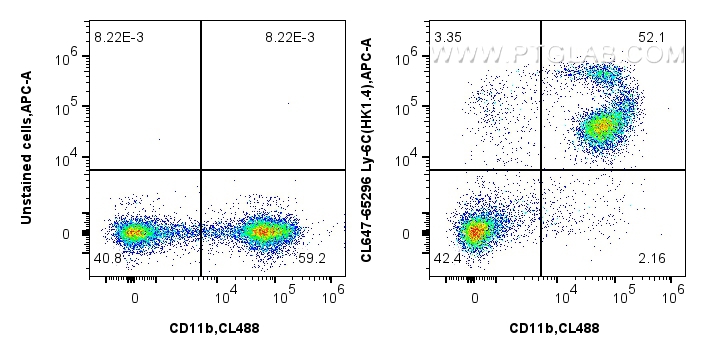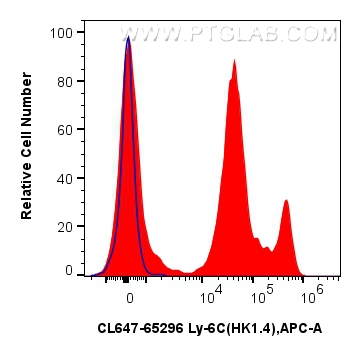验证数据展示
经过测试的应用
| Positive FC detected in | mouse bone marrow cells |
推荐稀释比
| 应用 | 推荐稀释比 |
|---|---|
| Flow Cytometry (FC) | FC : 0.25 ug per 10^6 cells in a 100 µl suspension |
| This reagent has been tested for flow cytometric analysis. It is recommended that this reagent should be titrated in each testing system to obtain optimal results. | |
| Sample-dependent, Check data in validation data gallery. | |
产品信息
CL647-65296 targets Ly-6C in FC applications and shows reactivity with mouse samples.
| 经测试应用 | FC Application Description |
| 经测试反应性 | mouse |
| 免疫原 |
L3 cloned CTL cells 种属同源性预测 |
| 宿主/亚型 | Rat / IgG2c |
| 抗体类别 | Monoclonal |
| 产品类型 | Antibody |
| 全称 | lymphocyte antigen 6 complex, locus C1 |
| 别名 | Ly6c, HK1.4, Ly 6C, Ly6c1 |
| GenBank蛋白编号 | BC010764 |
| 基因名称 | Ly-6C |
| Gene ID (NCBI) | 17067 |
| RRID | AB_3673578 |
| 偶联类型 | CoraLite® Plus 647 Fluorescent Dye |
| 最大激发/发射波长 | 654 nm / 674 nm |
| 形式 | Liquid |
| 纯化方式 | Affinity purification |
| UNIPROT ID | P0CW02 |
| 储存缓冲液 | PBS with 0.09% sodium azide, pH 7.3. |
| 储存条件 | Store at 2-8°C. Avoid exposure to light. Stable for one year after shipment. |
背景介绍
Ly-6C (lymphocyte antigen 6 complex, locus C) is a 14-17 kDa GPI-linked cell surface antigen that belongs to the Ly-6 family of glycosyl phosphatidylinositol-anchored surface glycoproteins (PMID: 9192663). Ly-6C is expressed on mouse monocytes/macrophages, endothelial cells, granulocytes, thymocytes, and some T cell subsets (PMID: 2849552). The two alleles of Ly-6C, Ly-6C.1 and Ly-6C.2, result in differential expression of this protein on subpopulations of CD4+ T cells (PMID: 15057973; 9126982). Ly-6C has been reported as a marker of memory CD8+ T cells (PMID: 7543536).
实验方案
| Product Specific Protocols | |
|---|---|
| FC protocol for CL Plus 647 Ly-6C antibody CL647-65296 | Download protocol |
| Standard Protocols | |
|---|---|
| Click here to view our Standard Protocols |



